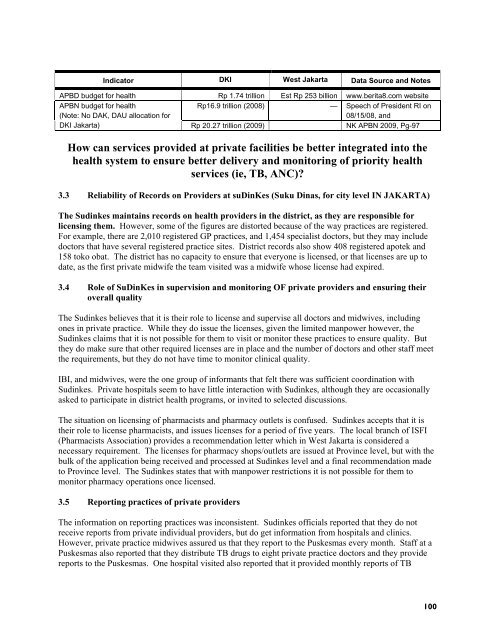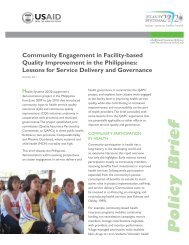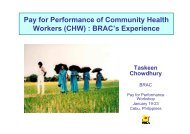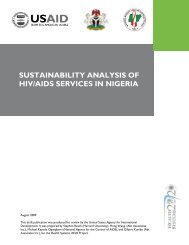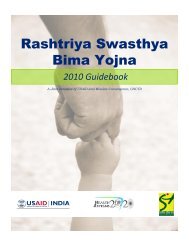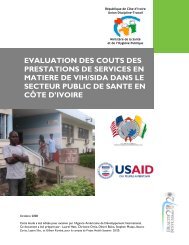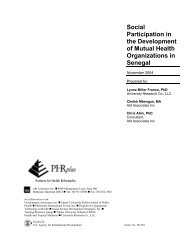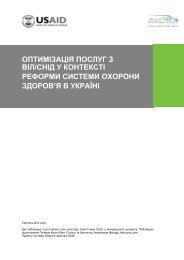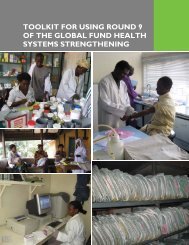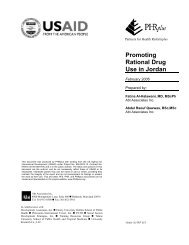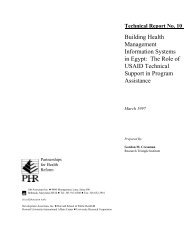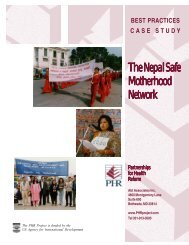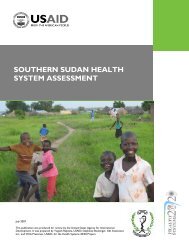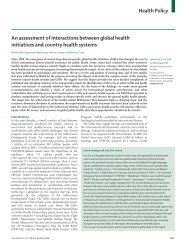Indicator DKI West Jakarta Data Source and NotesAPBD budget for health Rp 1.74 trillion Est Rp 253 billion www.berita8.com websiteAPBN budget for health(Note: No DAK, DAU allocation forDKI Jakarta)Rp16.9 trillion (2008)Rp 20.27 trillion (2009)— Speech of President RI on08/15/08, andNK APBN 2009, Pg-97How can services provided at private facilities be better integrated into thehealth system to ensure better delivery and monitoring of priority healthservices (ie, TB, ANC)?3.3 Reliability of Records on Providers at suDinKes (Suku Dinas, for city level <strong>IN</strong> JAKARTA)The Sudinkes maintains records on health providers in the district, as they are responsible forlicensing them. However, some of the figures are distorted because of the way practices are registered.For example, there are 2,010 registered GP practices, and 1,454 specialist doctors, but they may includedoctors that have several registered practice sites. District records also show 408 registered apotek and158 toko obat. The district has no capacity to ensure that everyone is licensed, or that licenses are up todate, as the first private midwife the team visited was a midwife whose license had expired.3.4 Role of SuDinKes in supervision and monitoring OF private providers and ensuring theiroverall qualityThe Sudinkes believes that it is their role to license and supervise all doctors and midwives, includingones in private practice. While they do issue the licenses, given the limited manpower however, theSudinkes claims that it is not possible for them to visit or monitor these practices to ensure quality. Butthey do make sure that other required licenses are in place and the number of doctors and other staff meetthe requirements, but they do not have time to monitor clinical quality.IBI, and midwives, were the one group of informants that felt there was sufficient coordination withSudinkes. Private hospitals seem to have little interaction with Sudinkes, although they are occasionallyasked to participate in district health programs, or invited to selected discussions.The situation on licensing of pharmacists and pharmacy outlets is confused. Sudinkes accepts that it istheir role to license pharmacists, and issues licenses for a period of five years. The local branch of ISFI(Pharmacists Association) provides a recommendation letter which in West Jakarta is considered anecessary requirement. The licenses for pharmacy shops/outlets are issued at Province level, but with thebulk of the application being received and processed at Sudinkes level and a final recommendation madeto Province level. The Sudinkes states that with manpower restrictions it is not possible for them tomonitor pharmacy operations once licensed.3.5 Reporting practices of private providersThe information on reporting practices was inconsistent. Sudinkes officials reported that they do notreceive reports from private individual providers, but do get information from hospitals and clinics.However, private practice midwives assured us that they report to the Puskesmas every month. Staff at aPuskesmas also reported that they distribute TB drugs to eight private practice doctors and they providereports to the Puskesmas. One hospital visited also reported that it provided monthly reports of TB100
clients to Dinkes. The private providers only reported activities related to drugs or funding they receivedfrom the local government.The consistency of reporting depends on the type of private provider. A discussion with private practicemidwives found that all were reporting information on services provided to both the peskesmas and to theIBI district chapter. They all used a standard form for reporting, and as a rule, there are few lapses inreporting. However, it is not clear whether Sudinkes uses this information for planning or decisionmaking. The midwives report that they never receive any feedback related to these reports. The teamalso visited a private practice midwife and small group practice of General Physicians. The midwifestated that she was seeing less than 10 clients per month for contraceptive injection, but her license hadexpired and she was not reporting to Sudinkes. The doctor who was interviewed in a small group practicedid not know whether service reports were sent to Sudinkes.At present pharmacies do not undertake any reporting for most medicines and are only required to providereports for narcotics and psychotropic preparations which few shops handle.3.6 Dinkes experience with PUBLIC-<strong>PRIVATE</strong> PARTNERSHIPSDinkes (?) has a program supported by the GFATM and USAID to conduct DOTS treatment, whichincludes private doctors, but very few doctors participate in this scheme. The doctors are also required toprovide reports to Dinkes, if they participated. Further, this program is closing down as they are nolonger receiving TB medicine and funding from GFATM. Although there were programs in the past toprovide TB medications, vaccines, and contraceptives through private providers, they are no longeroperating.St Carolus Hospital, a not for profit Catholic hospital, has been active in TB control and treatment for 26years. Its activities include training for community members in DOTS, distribution of treatment kits, andpublic health promotion. It treatment success rate is over 90 percent. If there is a shortage of drugs, thehospital procures from its own funds. St Carolus also provides public health services includingimmunization, and school-based health programs through its health center, with little support fromgovernment, except for medicines. Depkes had also provided rice to supplement the nutrition of lowincome patients, but that program has also ended.The not-for-profit hospitals we visited believed it is unfair for the government to treat not-for-profithospitals the same as for-profit hospitals, particularly with regard to tax treatment and utilities rates.These hospitals believed they have contributed to public health, and provide a high proportion of theirservices for low-income clients which should be government responsibility, often with limitedgovernment support.What can be done to rationalize the use of medications, as part of anintegrated provider quality improvement approach?3.7 Sources of medications for private providersBy far the main source of medicines for private hospitals is through national pharmaceutical distributors.Most hospitals report using six to eight main distributors and report the ready availability of all medicinesrequired. Private hospitals report that they can obtain significant price discounts from the distributerswith a general 10 percent reduction on brand name medicines and 30 percent reduction on genericmedicines, and under ASKES schemes a general 20 percent discount from the distributers. Privatehospitals reported using a combination of generic and brand name products, but at the pharmacy sections101
- Page 1:
PRIVATE SECTOR HEALTHCARE IN INDONE
- Page 5:
PRIVATE SECTOR HEALTH CAREIN INDONE
- Page 8 and 9:
7. Rationalizing Use of Medications
- Page 11 and 12:
ABBREVIATIONSANCAskesAskeskinAusAID
- Page 13:
THEUSAIDVATWHOTotal health expendit
- Page 17 and 18:
EXECUTIVE SUMMARYAs documented in I
- Page 19 and 20:
By using their power to select whic
- Page 21:
higher reimbursement for complex de
- Page 25 and 26:
2. BACKGROUND2.1 GENERAL BACKGROUND
- Page 27 and 28:
While decentralization of the healt
- Page 29:
FIGURE 1: TOTAL EXPENDITURES ON HEA
- Page 32 and 33:
poor, which only allows use of publ
- Page 34 and 35:
Lack of overall investment in healt
- Page 36 and 37:
• Pharmacists and drugsellers - A
- Page 38 and 39:
4.2 ASSESSMENT APPROACHData collect
- Page 40 and 41:
practice, however, limited resource
- Page 42 and 43:
Dinas to the hospital detailing the
- Page 44 and 45:
Unlike Muhammadiyah and NU faciliti
- Page 46 and 47:
TABLE 3: POPULATION COVERAGE BY HEA
- Page 48 and 49:
customary fees. At the same time, i
- Page 51 and 52:
7. RATIONALIZING USE OFMEDICATIONS7
- Page 53 and 54:
too few medicines to meet the publi
- Page 55 and 56:
8. PHARMACISTS ANDDRUGSELLERS AS PA
- Page 57 and 58:
district provides TB drugs to priva
- Page 59 and 60:
9. ROLE OF PROFESSIONALASSOCIATIONS
- Page 61 and 62:
IMA is involved in any allegations
- Page 63 and 64:
10. CONCLUSIONS ANDRECOMMENDATIONSI
- Page 65:
If Indonesia is to achieve its prio
- Page 68 and 69:
• Supporting the mapping of all f
- Page 71 and 72: ANNEX A: ASSESSMENT GUIDEIndonesia
- Page 73 and 74: Key Informants at Provincial LevelK
- Page 75: Key InformantsoooIBI, and memberrep
- Page 78 and 79: Assessment Question Approach/Backgr
- Page 80 and 81: Indicator Number Data Source and No
- Page 82 and 83: 1.3.4 DinKes Experience with Privat
- Page 84 and 85: The team interviewed a manager 16 a
- Page 86 and 87: They have used many different healt
- Page 88 and 89: In Yogyakarta Province, there are 1
- Page 90 and 91: graduates to work immediately in 24
- Page 92 and 93: Muhammadiyah is a 226 bed hospital
- Page 94 and 95: Dinas Yogyakarta31. Mardiningsih, S
- Page 96 and 97: 2.1 Provincial InformationThe popul
- Page 98 and 99: How can services provided at privat
- Page 100 and 101: The Provincial Health Office meets
- Page 102 and 103: from multiple sources: 40 percent f
- Page 104 and 105: 2.9 Licensing and Oversight of Phar
- Page 106 and 107: As per IMA Propinsi, they meet with
- Page 108 and 109: It was mentioned that the budget fo
- Page 110 and 111: • Private midwives are willing to
- Page 112 and 113: etween PKBI and the District Health
- Page 114 and 115: Cahya Kawaluyan Hospital has adapte
- Page 116 and 117: the midwife to charge a slightly hi
- Page 118 and 119: Involving Physicians in DOTS. A sig
- Page 120 and 121: Ikatan Bidan Indonesia (IBI) West J
- Page 124 and 125: visited an average of over 60 perce
- Page 126 and 127: 3.9 Potential role of professional
- Page 128 and 129: members who pay membership fees. Th
- Page 130 and 131: emainder paying out of pocket. Reve
- Page 132 and 133: 3.20 Indonesian Pharmacists Associa
- Page 134 and 135: OtherApotek Gitamara, Jl. Kemanggis
- Page 136 and 137: 13. Government of Indonesia, World
- Page 138: 41. Thrabany, Hasbullah, et al. 200


